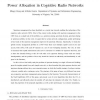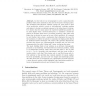21 search results - page 3 / 5 » Learning Equilibrium in Resource Selection Games |
91
Voted
MST
2010
14 years 11 months ago
2010
We study here the effect of concurrent greedy moves of players in atomic congestion games where n selfish agents (players) wish to select a resource each (out of m resources) so ...
111
Voted
ICRA
2010
IEEE
14 years 11 months ago
2010
IEEE
Multi-robot systems researchers have been investigating adaptive coordination methods for improving spatial coordination in teams. Such methods adapt the coordination method to th...
138
click to vote
CORR
2011
Springer
14 years 7 months ago
2011
Springer
Spectrum management has been identified as a crucial step towards enabling the technology of the cognitive radio network (CRN). Most of the current works dealing with spectrum ma...
111
Voted
JSAC
2010
14 years 11 months ago
2010
—Inspired by the biological entities’ ability to achieve reciprocity in the course of evolution, this paper considers a conjecture-based distributed learning approach that enab...
102
Voted
CRYPTO
2000
Springer
15 years 5 months ago
2000
Springer
In this work we use cryptography to solve a game-theoretic problem which arises naturally in the area of two party strategic games. The standard game-theoretic solution concept for...


